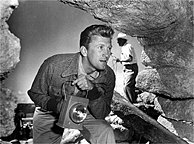Daniel Okrent's Non-Bias Bias
Daniel Okrent, the New York Times Public Editor, has always been a wuss. From time to time he would actually use a declarative sentence, such as his pronouncement that the Times was a liberal newspaper (oh my! what a surprise). But his column today is really pathetic.
The purpose of this column was to deal with the issue of whether or not the Times is biased for or against Israel. Instead of dealing with any of the actual allegations that have been made, he just shrugs his shoulders like a janitor with a faucet he can't fix and says, "not my problem."
Most of his column today is a condescending lecture, and he tops off his evasions by using the rhetorical device of the "convenient critic."
Palestinian polemicists constantly find nits to pick at the Times, the Guardian and other media outlets, for the purpose of keeping them on their toes and also, most importantly, to give these newspapers the ability to claim that they are "criticized by both sides." The Guardian will always tell you that. They "get hate mail from both sides." It is convenient to have such critics.
So, naturally enough, Okrent digs out some nutjob at an organization no one has ever heard of who criticizes the Times for "ignoring the deaths of Palestinian children" (as if Times reporters wouldn't be garrotted if they did that). He uses that to counteract the genuine critcism, the nonconvenient criticism, that comes in from the Israeli side.
Then comes this whopper: Okrent says "I'm still waiting for one reader to say the paper has ever been unfair in a way that was damaging to both sides."
Imagine that. To be inaccurate is not enough. To be damaging to one side--the definition of bias, after all--is not enough. In order to get Dan Okrent out of bed on this issue, it has got to be "damaging to both sides." But if something is "damaging to both sides" it can't be bias, can it? So what worries this guy? Non-bias?
Actually what I'm doing here is assuming Dan actually thought out what he put on paper. He just wanted to collect his last paycheck, clear out his desk and move on.
The new Public Editor, a veteran Wall Street Journal editor named Barney Calame, is a good man. Unfortunately he hasn't much of an act to follow.
The purpose of this column was to deal with the issue of whether or not the Times is biased for or against Israel. Instead of dealing with any of the actual allegations that have been made, he just shrugs his shoulders like a janitor with a faucet he can't fix and says, "not my problem."
Most of his column today is a condescending lecture, and he tops off his evasions by using the rhetorical device of the "convenient critic."
Palestinian polemicists constantly find nits to pick at the Times, the Guardian and other media outlets, for the purpose of keeping them on their toes and also, most importantly, to give these newspapers the ability to claim that they are "criticized by both sides." The Guardian will always tell you that. They "get hate mail from both sides." It is convenient to have such critics.
So, naturally enough, Okrent digs out some nutjob at an organization no one has ever heard of who criticizes the Times for "ignoring the deaths of Palestinian children" (as if Times reporters wouldn't be garrotted if they did that). He uses that to counteract the genuine critcism, the nonconvenient criticism, that comes in from the Israeli side.
Then comes this whopper: Okrent says "I'm still waiting for one reader to say the paper has ever been unfair in a way that was damaging to both sides."
Imagine that. To be inaccurate is not enough. To be damaging to one side--the definition of bias, after all--is not enough. In order to get Dan Okrent out of bed on this issue, it has got to be "damaging to both sides." But if something is "damaging to both sides" it can't be bias, can it? So what worries this guy? Non-bias?
Actually what I'm doing here is assuming Dan actually thought out what he put on paper. He just wanted to collect his last paycheck, clear out his desk and move on.
The new Public Editor, a veteran Wall Street Journal editor named Barney Calame, is a good man. Unfortunately he hasn't much of an act to follow.


<< Home